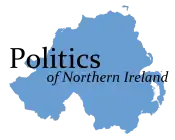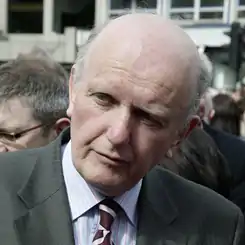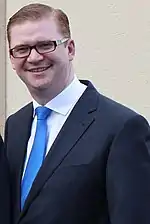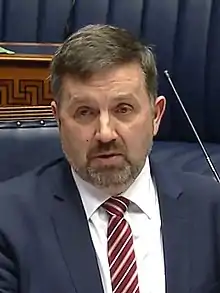Department of Health (Northern Ireland)
The Department of Health (DoH, Irish: An Roinn Sláinte (IPA:[ˈanˠˈɾˠiːn̪ʲˈsˠlaːnʲtʲə]), Ulster-Scots: Männystrie o Poustie) is a devolved Northern Irish government department in the Northern Ireland Executive. The minister with overall responsibility for the department is the Minister of Health.
 | |
| Department overview | |
|---|---|
| Formed | June 1944 (as Ministry of Health and Local Government) |
| Preceding Department | |
| Jurisdiction | Northern Ireland |
| Headquarters | Castle Buildings, Stormont Estate, Belfast, BT4 3SJ |
| Employees | 731 (September 2011)[1] |
| Annual budget | £4,383.1 million (current) & £200.5 million (capital) for 2011–12[2] |
| Minister responsible |
|
| Website | www.health-ni.gov.uk |
| This article is part of a series within the Politics of the United Kingdom on the |
 |
|---|
|
Until 9 May 2016, the department was previously called the Department of Health, Social Services and Public Safety (Irish: An Roinn Sláinte, Seirbhísí Sóisialta agus Sábháilteachta Poiblí).
Aim
DoH's overall aim and mission is to "improve the health and social well-being of the people of Northern Ireland."[3]
The department launched a new digital strategy in August 2022. It includes the Encompass programme which will create a unified health and care record for the province.[4]
Responsibilities
The Minister, assisted by the department, makes policy and legislation in three broad areas:
- health and social care – hospitals, family practitioner services and community health and personal social services;
- public health – promoting and protecting the health and well-being of the population; and
- public safety – the Northern Ireland Fire and Rescue Service (commonly known by its former name, the Northern Ireland Fire Brigade) but not the Police Service of Northern Ireland or HM Coastguard.
Some sensitive health policy issues are reserved to Westminster and are therefore not devolved:[5]
- human fertilisation and embryology
- human genetics
- surrogacy
- xenotransplantation
In Northern Ireland, abortion law is a criminal justice matter and is devolved.[6]
DoH's main counterparts in the United Kingdom Government are:
- the Department of Health;[7]
- the Department for Communities and Local Government (on fire services).[8]
In the Irish Government, its main counterparts are:
- the Department of Health;[9]
- the Department of Housing, Local Government and Heritage (on fire services).[10]
Health and Social Care organisations
The Health and Social Care system in Northern Ireland consists of the following public bodies:
Northern Ireland-wide
- Health and Social Care Board
- Northern Ireland Ambulance Service Health and Social Care Trust
- Northern Ireland Blood Transfusion Service
- Business Services Organisation
- Northern Ireland Fire and Rescue Service
- Public Health Agency
- Regulation and Quality Improvement Authority
Sub-regional health and social care trusts
History
Health policy in Northern Ireland was originally a responsibility of local government and the Ministry of Home Affairs, which (similarly to the Home Office) retained responsibility for policy areas not delegated to other ministries.
A separate Ministry of Health and Local Government was established in June 1944, as part of the welfare state. In January 1965, that department was divided between the Ministry of Development and the Ministry of Health and Social Services.
The latter ministry was renamed as the Department of Health and Social Services under direct rule, introduced in March 1972. A health and social services ministry was also included in the Northern Ireland Executive briefly established in 1974. The department was responsible for social security policy and its initials DHSS are still used locally to describe benefits and benefit claimants.
Following a referendum on the Belfast Agreement on 23 May 1998 and the granting of royal assent to the Northern Ireland Act 1998 on 19 November 1998, a Northern Ireland Assembly and Northern Ireland Executive were established by the United Kingdom Government under Prime Minister Tony Blair.
In December 1999, the Department of Health and Social Services was renamed as the Department of Health, Social Services and Public Safety. It gained responsibility for the Northern Ireland Fire Brigade from the Department of the Environment but ceded social security to the Department for Social Development. DHSSPS was therefore one of the six direct rule Northern Ireland departments to continue in existence following devolution, following the Northern Ireland Act 1998 and The Departments (Northern Ireland) Order 1999.
A devolved minister took office on 2 December 1999. Devolution was suspended for four periods, during which the department came under the responsibility of direct rule ministers from the Northern Ireland Office:
- between 12 February 2000[11] and 30 May 2000;[12]
- on 11 August 2001;[13][14]
- on 22 September 2001;[15][16]
- between 15 October 2002[17] and 8 May 2007.[18]
Since 8 May 2007, devolution has operated without interruption.
Ministers of Health
| Minister | Image | Party | Took office | Left office | |
|---|---|---|---|---|---|
| Bairbre de Brún | .jpg.webp) | Sinn Féin | 29 November 1999 | 11 February 2000 | |
| Office suspended | |||||
| Bairbre de Brún | .jpg.webp) | Sinn Féin | 30 May 2000 | 14 October 2002[19] | |
| Office suspended | |||||
| Michael McGimpsey |  | Ulster Unionist | 14 May 2007 | 5 May 2011 | |
| Edwin Poots | .jpg.webp) | DUP | 16 May 2011 | 23 September 2014 | |
| Jim Wells |  | DUP | 24 September 2014 | 11 May 2015 | |
| Simon Hamilton |  | DUP | 11 May 2015 | 30 March 2016[note 1] | |
| Office renamed Minister of Health | |||||
| Michelle O'Neill |  | Sinn Féin | 25 May 2016 | 2 March 2017 | |
| Office suspended | |||||
| Robin Swann |  | Ulster Unionist | 11 January 2020 | 27 October 2022 | |
Direct rule ministers
During the periods of suspension, the following ministers of the Northern Ireland Office were responsible for the department:
- George Howarth (2000)
- Des Browne (2002–03)
- Angela Smith (2003–05)
- Shaun Woodward (2005–06)
- Paul Goggins (2006–07)
References
- "Northern Ireland Quarterly Employment Survey Historical Data". Department of Enterprise, Trade and Investment. Archived from the original on 16 March 2012. Retrieved 28 December 2011.
- "Budget 2011–15" (PDF). Department of Finance and Personnel. Archived from the original (PDF) on 13 December 2011. Retrieved 28 December 2011.
- Northern Ireland Budget 2011–15, page 70
- "Digital strategy will unlock opportunities for health service improvements". Building Better Healthcare. 3 August 2022. Retrieved 29 September 2022.
- Northern Ireland Act 1998, Schedule 3
- House of Commons, Written answers and statements, 13 July 2009
- "DH: About the Department of Health". Archived from the original on 14 December 2009. Retrieved 4 January 2011.
- Communities and Local Government: Fire and resilience
- Department of Health: About the Department Archived 20 May 2011 at the Wayback Machine
- Environment, Community and Local Government: Fire and Emergency Services Archived 27 December 2010 at the Wayback Machine
- Article 2, Northern Ireland Act 2000 (Commencement) Order 2000
- Article 2, Northern Ireland Act 2000 (Restoration of Devolved Government) Order 2000
- Article 1, Northern Ireland Act 2000 (Suspension of Devolved Government) Order 2001
- Article 2, Northern Ireland Act 2000 (Restoration of Devolved Government) Order 2001
- Article 1, Northern Ireland Act 2000 (Suspension of Devolved Government) (No.2) Order 2001
- Article 2, Northern Ireland Act 2000 (Restoration of Devolved Government) (No.2) Order 2001
- Article 1, Northern Ireland Act 2000 (Suspension of Devolved Government) Order 2002
- Article 2, Northern Ireland Act 2000 (Restoration of Devolved Government) Order 2007
- Office suspended for 24 hours on 11 August 2001 and 22 September 2001
- Resigned on 10 September 2015, re-entered office on 16 Sept. till 17 Sept., then on the 23 Sept.-24 Sept, then 28 Sept.-29 Sept., then 30 Sept.-1 Oct. 2015. Following the 20 October he permanently occupies the office
External links
- Official website
- "The Departments (Northern Ireland) Order 1999" (PDF). (37.0 KB)